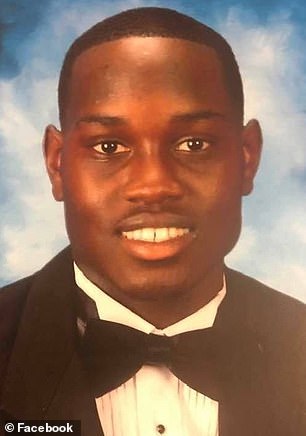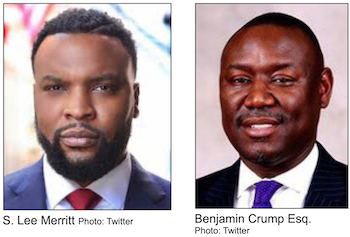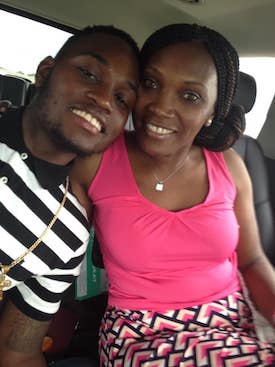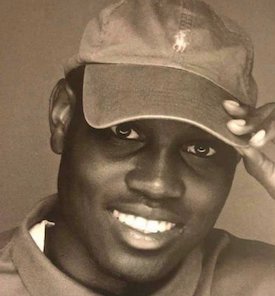Justice for Ahmaud!
By Bryan 18X Crawford and J.S. Adams The Final Call @TheFinalCall | Last updated: May 6, 2020 - 4:34:03 PMWhat's your opinion on this article?
The Deep South is known for its well-documented history of racial tension between Blacks and Whites that dates all the way back to the slave trade. While the year is 2020 and many things have changed, even in the face of a pandemic the extrajudicial killing of young, Black men continues.

Twenty-five-year-old Ahmaud Arbery was shot and killed February 23, as he took a jog through a neighboring suburb of Brunswick, Ga., a small town on the state’s East coast where Mr. Arbery lived. A disturbing and shocking video that reportedly shows the shooting made rounds on social media and the district attorney announced May 6 the case would be forwarded to a grand jury.
It’s a story that is eerily reminiscent of the Trayvon Martin case, particularly because it happened just three days prior to the eight-year anniversary of the teen being gunned down under similar circumstances by George Zimmerman in Florida. But adding to the complexity of what critics argue should be a “cut-and-dry murder case” for police, is that the White man who shot Ahmaud Arbery is the son of a former police officer and investigator within the Brunswick District Attorney’s office.
It took more than two-months since Mr. Arbery’s death for the story to garner national attention.
“We’re up against institutional racism, which is a whole system and network to protect the bad actors in this case,” civil rights attorney Lee Merritt, who is representing Mr. Arbery’s family, told The Final Call.

|
In a transcript of the 911 call made just before the shooting, which occurred around 1 o’clock in the afternoon, the dispatcher was told that a Black man wearing a white t-shirt was breaking into a house in the neighborhood. However, the house that Mr. Arbery was allegedly accused of burglarizing was under construction, which under Georgia law doesn’t count as a break-in because no seal or lock was broken.
After the McMichaels approached Ahmaud Arbery, according to the police report, a struggle ensued over Travis McMichael’s shotgun, and Mr. Arbery was shot at least twice and died at the scene. The police report also names at least six witnesses, including the elder McMichael. One of the reported offenses on the police report is homicide.
Racially motivated attack?
Wanda Cooper, Ahmaud Arbery’s mother, says when police told her about what happened to her son, and in the weeks that followed in the aftermath of his death, she felt as if the original prosecutor on the case, George Barnhill, had no interest in pursuing justice for her son.
“When I spoke to Mr. Barnhill the first time to let him know I had concerns, he spoke to me very nonchalantly. He treated me like I had did something wrong,” Ms. Cooper told The Final Call. “He didn’t do anything to give me any sense that he would work my son’s case to seek justice. He was very blunt in his conversations with me. And at that point, I knew I was in trouble,” she said.
“The conclusions made by Mr. Barnhill were not legally sound, and they were also racist. He should be ashamed,” Atty. Merritt said, adding of Mr. Barnhill, “He put race on the table. He didn’t use racial terms, but he made wild accusations about Ahmaud’s behavior from an incident he had in high school, without actually delving into the actions of the culprits. That was racism.” He continued, “When he decided to put Mr. Arbery on trial, despite the fact that he was the one killed while simply on a jog, George Barnhill spent very little time actually investigating what happened that day, which is his job.”
In 2013, Ahmaud Arbery was indicted for taking a .380 caliber gun to a high school basketball game. He received five years’ probation in that incident. In 2018, he was convicted for violating the terms of his probation when he was arrested and charged with shoplifting. But despite these misdeeds, on the day he was killed, Ahmaud Arbery was reportedly unarmed and not breaking any laws. He was just simply taking a jog, which was part of his daily routine.

Ahmaud with his mother. Photo: FacebookTwitter
|
“I knew that he jogged, but I wasn’t aware of the actual route he took day-by-day. But I knew that he went to that subdivision on his jogs because I’ve been told by people in that subdivision who had seen him either every day, or every other day,” his mother said.
Gregory and Travis McMichael, according to Mr. Barnhill in a letter to the Glynn County Police Department, had operated within the scope of Georgia’s citizen’s arrest law and acted in self-defense in the altercation that led to Ahmaud Arbery’s death. Mr. Barnhill said that Ahmaud Arbery had mental health issues, and because of his criminal background, possessed an aggressive nature that explained why he would attack Travis McMichael, who was armed. Additionally, because the McMichaels were legally carrying firearms, and because Mr. Arbery was an accused burglary suspect, Mr. Barnhill said they were justified in following and confronting him under Georgia state law.
According to Mr. Barnhill’s letter the three men “were following, in pursuit burglary suspect, with solid first hand probable cause, in their neighborhood, and asking / telling him to stop. It appears their intent was to stop and hold this criminal suspect until law enforcement arrived.”
There is also video evidence of what happened that day which allegedly shows Mr. Arbery trying to grab the gun Travis McMichael was holding, leading Mr. Barnhill to conclude that the use of deadly force was justified.
“We believe there was a racial motivation for them attacking Ahmaud, and that’s not a subjective belief,” said Atty. Merritt, adding he believes the recordings of the statements made by Mr. Gregory McMichael “shows that the only indication and motivation they laid out was they saw a Black man run by, immediately decided to arrest him, and that it was okay to use deadly force. So, if the motivation for his arrest was his Blackness, and that was the only tangible evidence that they were relying on, we believe that qualifies as a hate crime.”
Attacking the victim?
George Barnhill recused himself from the case, as did Jackie Johnson, another Brunswick district attorney, citing a conflict of interest. Gregory McMichael worked cases in the offices of both DA’s; Mr. Barnhill’s son also works for the Brunswick district attorney.
Some have wondered if the relationships within these offices have contributed to the absence of charges. One of those people is Tamara Johnson-Shealey, a candidate for the United States Senate and a Georgia native.

|
Benjamin Crump, a civil rights attorney best known for his work during the Trayvon Martin case and the Michael Brown Jr. case in Ferguson, said these sorts of affiliations are something he constantly sees.
“We have these quasi law enforcement figures who are very much treated as if they’re law enforcement themselves,” Atty. Crump said. “So when you see that happening, they are oftentimes given the same immunity that we give law enforcement officers who [use deadly force on a daily basis].
“When a White person kills a Black person, there’s certainly no guarantee they’ll be put on death row, there’s hardly any guarantee that they’d even be put in prison. And because these are racist, Jim Crow stand your ground laws, it’s likely that they won’t even be arrested. They can come and kill people in our community, then go home and sleep in their beds at night,” he said.
According to Ms. Johnson-Shealey, these sorts of incidences are nothing new to a southern state like Georgia. She grew up in the southeastern part of the state, in a rural area, then eventually moved to Atlanta.
“Growing up in rural Georgia, where I still believe to this day racism is alive and well, but it’s so normalized in these rural areas. It’s just how it is,” she said. “A lot of times, both Black people and White people don’t realize that the world has changed. Things have evolved, and that’s not the way it is. But until you step out of rural Georgia and go into some of these major cities ... integration is real.”
Atty. Merritt says he will pursue federal hate crime charges, in addition to murder charges in this case. He is also requesting a special prosecutor to oversee this case, and would be open to a change of venue, which would likely be in Atlanta.
With the attacks on her son’s character because of his criminal record, Ms. Cooper says it’s painful to have to defend the man her son was, because no one knew him better than she did.
“It breaks my heart to hear and see people do that because my son was the victim in this. They’re making him look like he did something terribly wrong, and it’s definitely heartbreaking,” she said.
In 2009, Oscar Grant was shot and killed by a transit police officer in Oakland on New Year’s Day. During the murder trial of the officer who killed him, details of Grant’s criminal past were allowed to be heard by the jury. Cephus X Johnson, Oscar’s uncle and founder of the Oscar Grant Foundation, knows all too well the way Black men murdered at the hands of Whites are often forced to defend their character from the grave.
“The criminalization of our loved ones after they kill them is already traumatizing and painful to hear. But it’s another thing when they justify the shooting, they then try to pull up a criminal history to make it seem like this person should’ve been shot and killed because they feel like they were a criminal anyway. This is just as painful as the initial killing,” Mr. Johnson, also known as “Uncle Bobby,” told The Final Call.
“The whole process is unbelievable in how the system will take a small infraction in a person’s life to justify why they should’ve been killed,” he added.
“Maud had a great character. He was a very family-oriented young man. Very humble young man. He liked to stay fit, and he just loved people,” said Theawanza Brooks, the aunt of Ahmaud Arbery.
Mr. Arbery’s desire to stay in shape is what led him to go on routine runs throughout his neighborhood. According to Ms. Brooks, the neighbors loved to see him run. It reminded them of the classic character Forrest Gump, she said.
Weaponizing Whitness and the fight for justice
What makes this case even more troubling is it highlights another disturbing trend seen across America of late: the weaponizing of Whiteness, or the belief by a White person that he or she has the legal or moral authority to police Black bodies and Black behavior.
Mr. Johnson feels this is due in large part to the number of Black men and women killed at the hands of White people—in most cases, police officers—with almost little to no punishment given, and absolutely no justice given to the family of the Black victim.
“White folks have taken it upon themselves to act this way because the police have given them a sense of power, that if they want to use guns to straighten something out when it comes to them feeling Black people aren’t doing what they think they should be doing,” Mr. Johnson said, adding, “White people have been emboldened by seeing the police kill Black people, so they feel like it’s okay.”
The case was transferred to a district attorney more than an hour away from where the shooting took place. Tom Durden of Hinesville, Ga., announced May 6 that the case should go to a grand jury. The Final Call reached out to the Hinesville District Attorney’s office for comment, but had not received a response at press time.
Support for pushing the case forward has garnered online responses. A Facebook page, “I Run With Maud,” was started and has received over 23,000 likes. Those who have come across it have shared news stories about Mr. Arbery’s death and have even encouraged others to contact Mr. Durden.
Nicole Ransom lives in Brunswick and didn’t know Mr. Arbery personally, but knows some of his family members. “This happened in February and even the local news stations that are only one hour away north and south of Brunswick never reported anything until now. Why? Is it because it is getting national attention?” she said.
Ms. Ransom says she fears for her 13-year-old son. “I now have to explain this situation to him. I now have to explain you cannot go looking in vacant homes because they may say you are trying to steal something and please [don’t] go running in certain neighborhoods because you may get shot. I am very concerned on why no arrests have been made for this murder,” she said.
Ms. Johnson-Shealey says she has two sons who are also runners. “When they go out and run, I’m fearful, and I think it’s something that’s innate in Black people that we already know they’re gonna look at us different,” she said. “I try to do things and my sons get so angry at me because they’re like, ‘mom, I’m not doing that.’ I’m like, don’t run with your hoodie on. Things that shouldn’t make me think like that, but I have to think like that.”
“The community has been very supportive, and they have expressed their condolences and sincere sympathy,” said Ms. Brooks. “They all want to see the same thing, one thing, and that’s justice for Ahmaud.” (This story was updated and look for additional coverage in an upcoming issue of The Final Call.)
INSIDE STORIES AND REVIEWS
-
-
About Harriett ... and the Negro Hollywood Road Show
By Rabiah Muhammad, Guest Columnist » Full Story -
Skepticism greets Jay-Z, NFL talk of inspiring change
By Bryan 18X Crawford and Richard B. Muhammad The Final Call Newspaper @TheFinalCall » Full Story -
The painful problem of Black girls and suicide
By Charlene Muhammad -National Correspondent- » Full Story -
Exploitation of Innocence - Report: Perceptions, policies hurting Black girls
By Charlene Muhammad -National Correspondent- » Full Story -
Big Ballin: Big ideas fuel a father’s Big Baller Brand and brash business sense
By Bryan Crawford -Contributing Writer- » Full Story






 Click Here Stay Connected!
Click Here Stay Connected!








